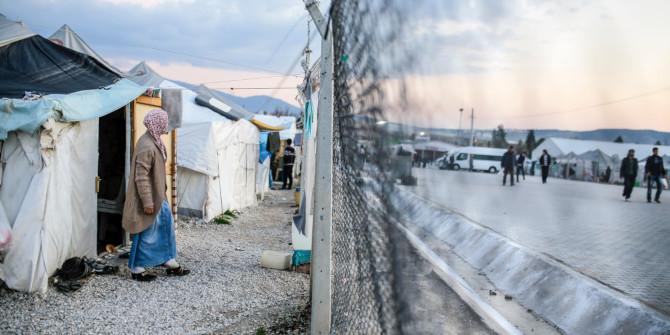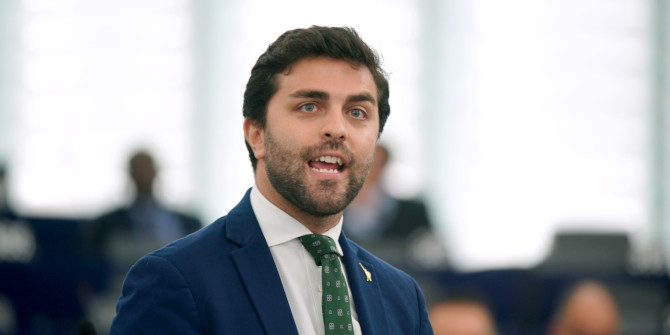In 2015, EU countries struggled to cope with a sharp increase in the number of migrants and refugees entering Europe. But how did the crisis affect public opinion toward free movement within the EU? Drawing on a new study, Philipp Lutz finds that contrary to expectations, the crisis did not result in citizens turning away from free movement. Rather, there has been an increase in support for stronger external controls on immigration from outside the EU.
Surging refugee arrivals in 2015 shook the European Union and highlighted its dysfunctionalities in responding to large migration movements. The crisis catapulted the immigration issue to the top of the political agenda and helped facilitate the electoral success of radical-right parties. It also tapped into the fears and hopes of many politicians in relation to the impact of immigration on public support for the European Union.
The EU’s supporters feared that the visible loss of control when it came to preventing the mass arrival of asylum seekers would undermine public support for an open Europe without internal borders and the free movement of its citizens. During the crisis, the European Commission in particular repeatedly suggested that an internal area without border controls is only possible with strong protection of the EU’s external borders. A restrictive approach towards immigration at the EU’s external borders was therefore justified as a precondition for the fundamental freedom of internal movement for EU citizens.
On the other side of the political spectrum, Eurosceptics hoped that the crisis would tilt public opinion in favour of a renationalisation of borders in Europe. A case in point was the focus of UKIP during the Brexit referendum on the EU’s failure to control its external borders in 2015. Both camps shared the view that internal freedoms within the European Union require a stronger demarcation between the EU and third countries, with restrictive control of non-European immigration.
The effect of the crisis on bordering preferences
In a recent study, I tested this assumption of integration-demarcation conditionality in the bordering preferences of European citizens. The aim was to assess how the 2015 failure of external border controls shaped the preferences of European citizens on internal and external bordering issues.
One might argue that the surge in refugee arrivals increased the visibility of symbolic threats arising from immigration, sending the signal that the EU is incapable of protecting an open Europe from external pressures. As a response, it might be expected that citizens would increase their support for internal rebordering to establish protection behind national borders. Alternatively, citizens might increase their support for external rebordering, with the EU viewed as something of a saviour in its capacity to tackle transnational threats such as irregular migration.

Credit: © European Union 2016 – European Parliament (CC BY-NC-ND 2.0)
To test these expectations, I analysed Eurobarometer data covering the period between 2012 and 2018. My research design took advantage of the timing of the crisis, with the situation making headlines across the continent in August 2015, as well as variation in the extent to which different member states were affected by refugee movements.
My findings indicated a small negative effect on public support for internal freedoms at the peak at the crisis and a large positive effect on public support for the protection of external borders. While public support for internal free movement has been highly resilient and continues to increase in the aftermath of the crisis, there has been a lasting effect on citizens’ perceptions of a loss of control.
At the same time, support for a more integrated European policy toward irregular immigration into the EU has increased. Despite the apparent surge of Euroscepticism in the public discourse during the crisis, citizens have not sought protection behind national borders by demanding internal rebordering. Instead, the crisis has motivated a clearer distinction between free movement within and immigration from outside the EU in the views of European citizens.
No backlash after all
The shock of 2015 has shaped the bordering preferences of European citizens at large, going beyond direct exposure to refugee arrivals. Yet in contrast to what might be expected, there is no sign of a lasting backlash against immigration and support for a Europe without internal borders. Rather, EU citizens increased their demand for effective integration, with the combination of freedoms inside the EU and restrictive controls toward the outside world.
In analysing the most significant crisis the European border regime has thus far experienced, I find little evidence for the idea that public support for an open Europe is conditional on external exclusion and the credibility of immigration control. The fears (and sometimes hopes) of European politicians have not materialised: the 2015 refugee crisis has resulted in more rather than less support for the European model of external border controls and internal freedoms.
For more information, see the author’s accompanying study in the Journal of European Public Policy
Note: This article gives the views of the author, not the position of EUROPP – European Politics and Policy or the London School of Economics. Featured image credit: © European Union 2016 – European Parliament (CC BY-NC-ND 2.0)





